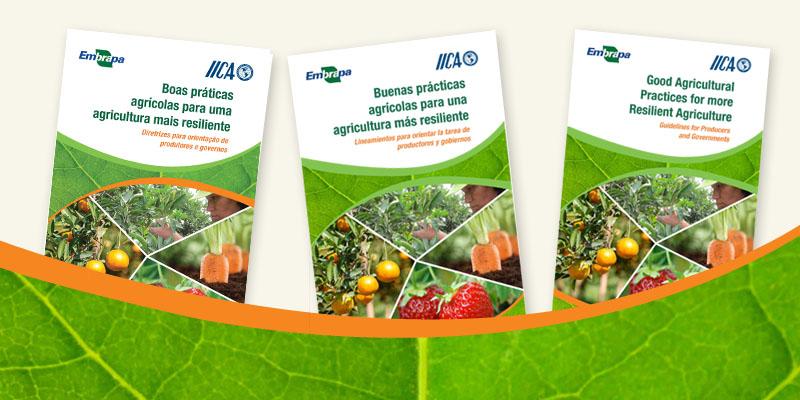An integrated approach to good agricultural practices (GAP) and close collaboration between producers and governments are key to the development of a more sustainable agriculture.

San Jose, 7 July, 2016 (IICA). A new book, published by the Inter-American Institute for Cooperation on Agriculture (IICA) and the Brazilian Agricultural Research Corporation (EMBRAPA), calls on producers and governments of the Americas to work together to improve the resilience of agriculture to climate variability and climate change by adopting a holistic vision that incorporates risk management into the implementation of good agricultural practices (GPA).
The book, entitled Good agricultural practices for a more resilient agriculture: Guidelines for producers and governments, contains recommendations drawn from various national programs implemented in the Americas, together with the views of experts, which are summarized in a set of indicators that serve as a planning and management tool, both for farmers and for government institutions.
“Applying good agricultural practices is indispensable for risk management, since these contribute to efforts to improve health, ensure safety, protect the environment and mitigate the effects of climate change. However, in order to make progress, it is first necessary to create awareness among governments and producers,” noted the Deputy Director General of IICA, Lloyd Day, during the launch of the book.
His views were endorsed by Katia Marzall, leader of IICA’s Flagship Project on Resilience and Integrated Risk Management, who also emphasized the need to promote innovation, increase knowledge and improve management strategies for production systems in order to boost their resilience and ensure their sustainability.
For his part, Alexandre Hoffmann, Assistant Director of Technology Transfer at EMBRAPA, acknowledged that since its foundation, his institution has maintained its commitment to accompany the trends prevailing in agriculture, the environment and among producers. “We are living in a unique moment; an important component of the GAP vision is the commitment to the environment and to generating a more sustainable form of production,” he said.
The new guide will serve as a complement to national GAP programs and national plans aimed at promoting adaptation to climate change and mitigating its effects. In addition, it aims to provide interested countries with a set of indicators that will contribute to their understanding of the problems to be addressed and help them design strategies and policies.

The book also considers the tasks of governments and producers. “Governments must be committed to establishing policies and facilitating access to public goods and services. Producers, for their part, must be committed to implementing good practices and must become aware that they, as the ones who directly work the land, have in their hands the possibility of transforming food production into a more productive activity, but also one that is more sustainable and respectful of the environment,” said Alejandra Díaz, IICA Specialist in Agricultural Health and Food Safety and co-author of the book.
This publication is aligned with the mandates and guidelines of the region’s Ministers of Agriculture, who have agreed on the need to promote an agricultural sector with production systems that manage natural resources more responsibly, to meet the demand for food and forage crops required by a growing world population, and in which risks are addressed in a comprehensive manner.
More information:
Alejandra Díaz, IICA Specialist in Agricultural Health and Food Safety
Summary: Concept note
Videos
Statements by Luciano Gebler, EMBRAPA researcher and co-author of the book (English)
Statements by Alejandra Díaz (Spanish)
Videos
Statements by Luciano Gebler, EMBRAPA researcher and co-author of the book











